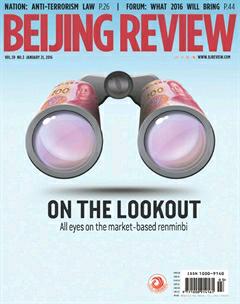‘In’Words
By+Ji+Jing
‘Internet Plus” and “maker” made Yaowen Jiaozi magazines list of the 10 most popular Chinese catchphrases of 2015. The list, published in the December 2015 issue, featured seven phrases from the Internet and three related to political and economic affairs.
Hao Mingjian, Editor in Chief of the magazine that specializes in correcting typos and the misuse of words in publications, said the selected phrases are frequently used because they reflect the realities of society and peoples aspirations.
For instance, a “sense of gain” originates from a speech made by President Xi Jinping during a meeting of the Central Leading Group for Overall and Further Reforms last February. Xi promised to bring citizens a greater “sense of gain” from Chinas reforms.
“The phrase is down-to-earth and reflects the expectations of ordinary citizens for social progress,” said Hao.
Huang Anjing, Executive Editor in Chief of the magazine, said, “Some catchphrases have also represented breakthroughs in linguistic structures. For instance, ‘Internet Plusis composed of a noun and a punctuation mark in Chinese. Its simple but informative.”
The Internet has become a breeding ground for hot words. The phrase zhuyao kan qizhi or “focus on my aura” went viral online after Taiwan-based singer Cindy Wang posted a photo from her new album of herself holding a hamburger on her Weibo microblogging social networking platform. Wang replied to criticisms that the photo was weird by posting “focus on my aura.” Later many social media users imitated Wang and posted photos accompanied by this phrase.
Huang cited three criteria for selecting the words and phrases: First, they should be popular and bear the imprints of the times; second, they should involve innovation and breakthrough in linguistic structures; and third, they should be polite. Some phrases such as ranbingluan, meaning “being nonetheless useless,” though popular, were excluded on the grounds of bad taste.
Zhang Yiwu, a professor with the Department of Chinese Language and Literature at Peking University, attributed the emergence of many new words and phrases to the Internet.
“Many catchphrases are peculiar to the Internet era. In the past, it was philosophers and writers who created new words, and ordinary people could hardly be part of language creation owing to limited communication methods,” said Zhang. “However, people are becoming more expressive. The Internet has provided them with a new chan- nel to share information and communicate with each other. New expressions have come into being in the process of online communications and some of them have become part of modern Chinese.”
Poet Ye Kuangzheng said relaxed regulations for language use have promoted linguistic innovation. Thats not to say we abandon regulations, but different criteria should be applied to media at different levels, Ye added. For instance, national media should adopt stricter rules for language use than local media.
“The practice of selecting catchphrases represents heightened attention to new expressions and should be encouraged,” said Ye.
Selecting hot words has become a trend in China. In addition to Yaowen Jiaozi, the National Language Resources Monitoring and Research Center at Beijing Language and Culture University, in conjunction with several other institutions, published the 10 most popular phrases in six categories on December 21, 2015. The categories included domestic politics, international politics, economic affairs, science and technology. The center has made such a selection for the past 10 years.
However, writer Zhe Fu is not optimistic about the sustainability of Internet buzzwords.
“Buzzwords are often short-lived because most of them stem from specific events or a specific environment,” Zhe said.“They will become redundant 10 or 20 years later when the context that gave rise to them changes.”
Tang Wenming, a professor with the Department of Philosophy at Tsinghua University, shares a similar view, predicting that hot words will have a short lifespan.
“Linguistic innovation is a serious matter,” said Tang. “For instance, Chinese idioms embody experiences of our ancestors and are still relevant today. However, hot words lack such experiences and therefore can hardly survive.”

